Analysing Corporate Strategy Formulation in Hospitality Management
VerifiedAdded on 2023/06/11
|11
|3881
|125
Essay
AI Summary
This essay provides a comprehensive analysis of strategic hospitality management, focusing on the formulation of corporate strategy and its linkage to the strategic management process. It critically elaborates on key concepts and approaches that are crucial for companies in the hospitality sector. The essay explores the application of the strategic management process within the industry, using Porter's Five Forces and PESTLE framework to analyse the macro environment and competitive landscape. It also addresses the challenges of implementing corporate strategy, highlighting the importance of competitive rivalry, the threat of new market entrants, the bargaining power of suppliers and buyers, and the threat of substitute products. The role of strategic management in enhancing operational excellence, building brand value, and improving customer loyalty is also discussed, with examples from Marriott Hotels and Resorts to illustrate key points. This resource is available on Desklib, a platform offering a wide range of study tools and solved assignments for students.
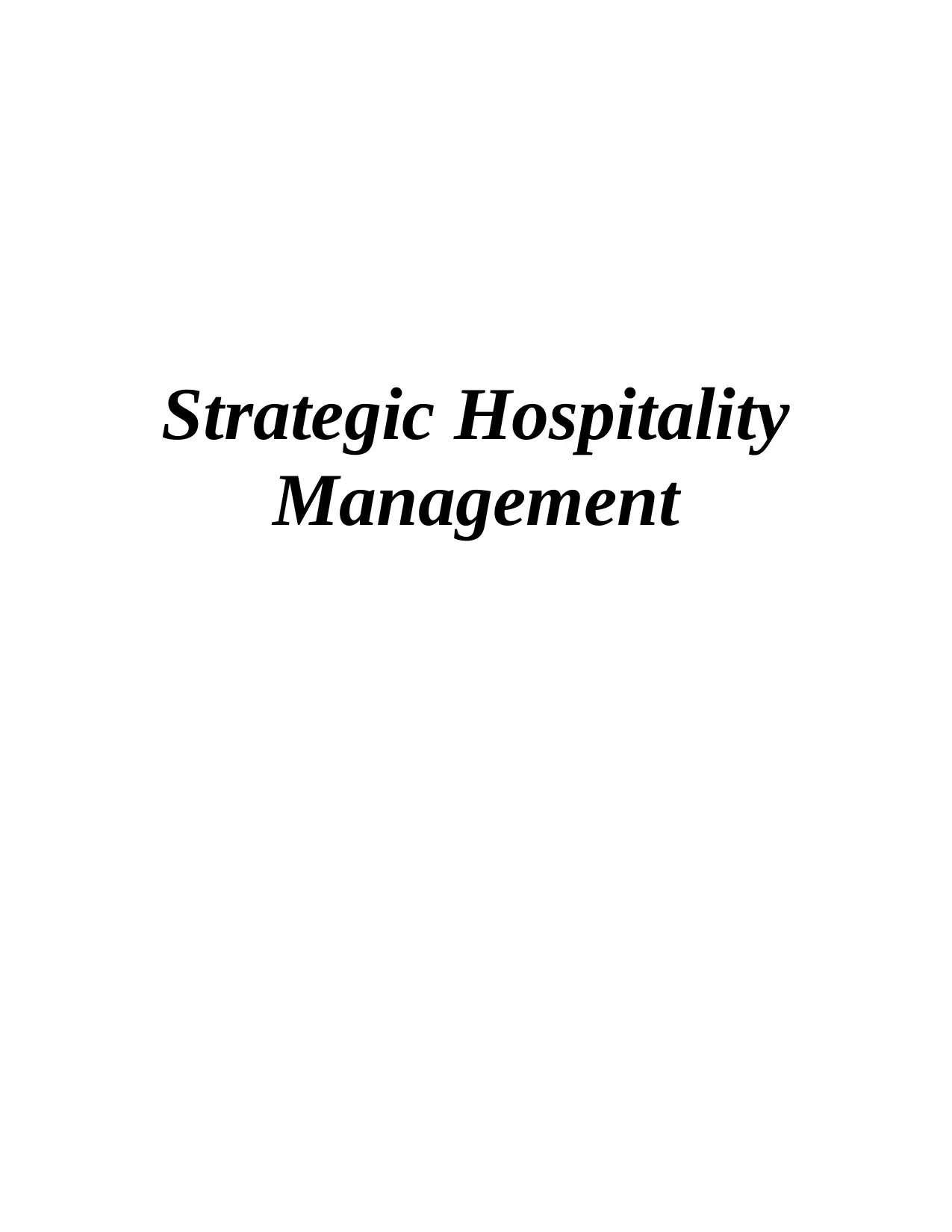
Strategic Hospitality
Management
Management
Paraphrase This Document
Need a fresh take? Get an instant paraphrase of this document with our AI Paraphraser
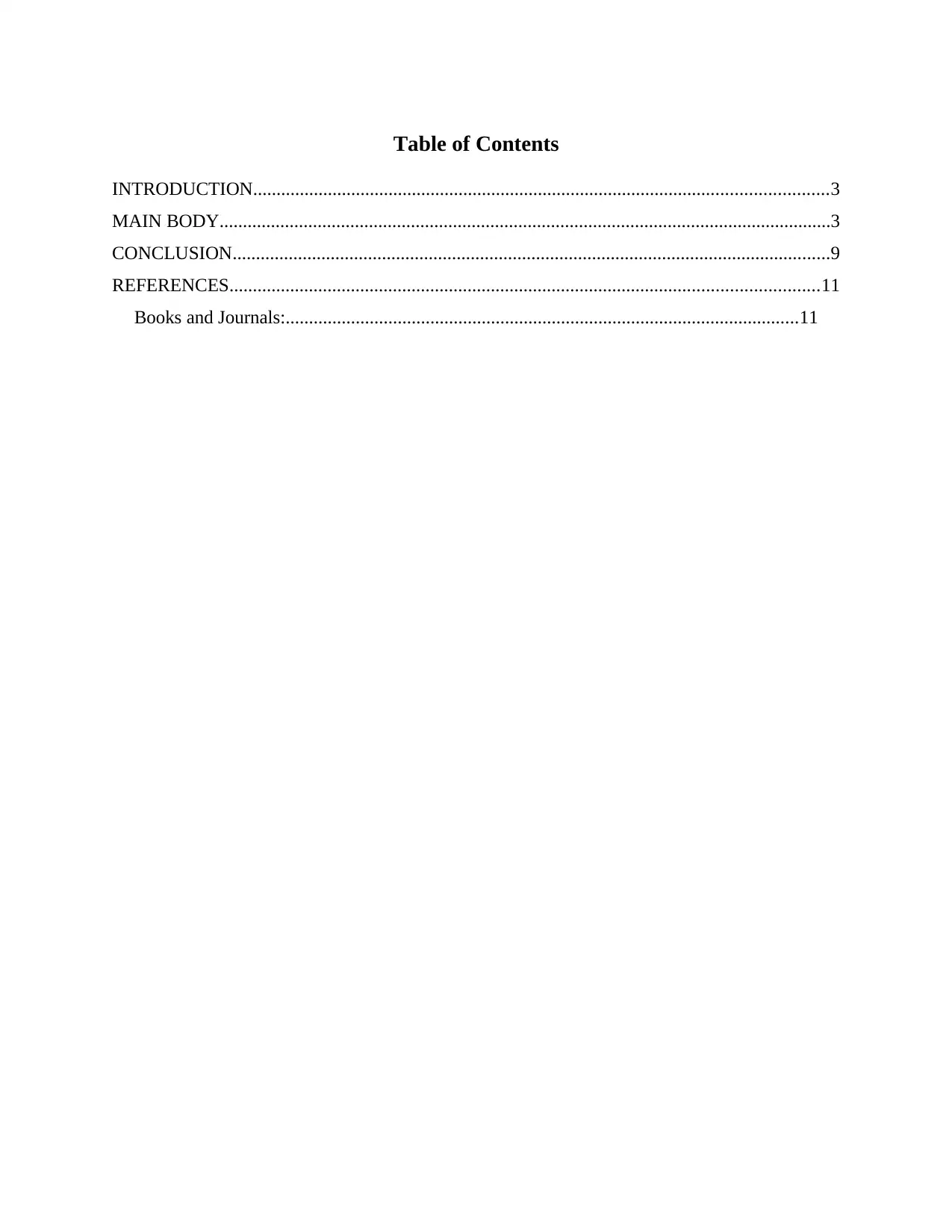
Table of Contents
INTRODUCTION...........................................................................................................................3
MAIN BODY...................................................................................................................................3
CONCLUSION................................................................................................................................9
REFERENCES..............................................................................................................................11
Books and Journals:..............................................................................................................11
INTRODUCTION...........................................................................................................................3
MAIN BODY...................................................................................................................................3
CONCLUSION................................................................................................................................9
REFERENCES..............................................................................................................................11
Books and Journals:..............................................................................................................11
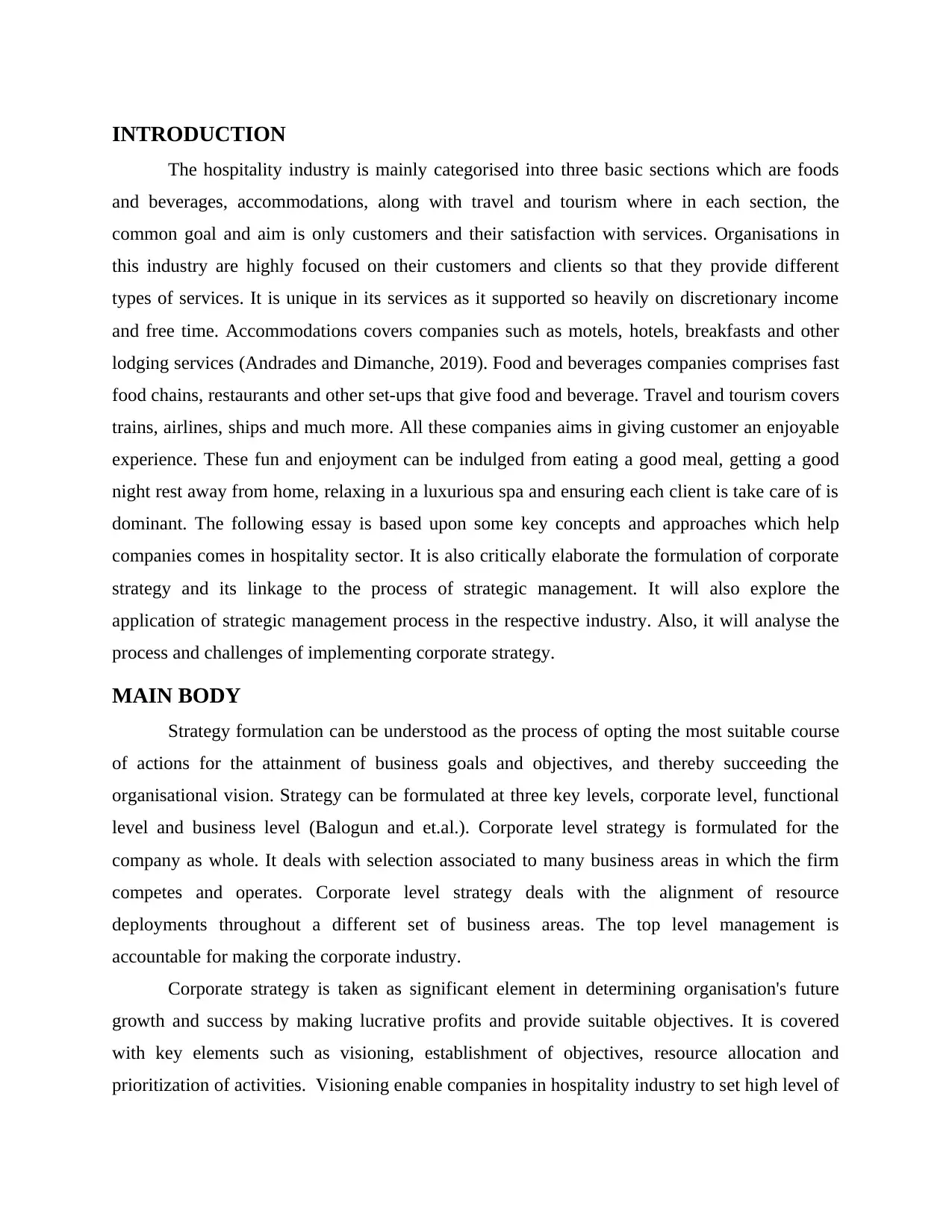
INTRODUCTION
The hospitality industry is mainly categorised into three basic sections which are foods
and beverages, accommodations, along with travel and tourism where in each section, the
common goal and aim is only customers and their satisfaction with services. Organisations in
this industry are highly focused on their customers and clients so that they provide different
types of services. It is unique in its services as it supported so heavily on discretionary income
and free time. Accommodations covers companies such as motels, hotels, breakfasts and other
lodging services (Andrades and Dimanche, 2019). Food and beverages companies comprises fast
food chains, restaurants and other set-ups that give food and beverage. Travel and tourism covers
trains, airlines, ships and much more. All these companies aims in giving customer an enjoyable
experience. These fun and enjoyment can be indulged from eating a good meal, getting a good
night rest away from home, relaxing in a luxurious spa and ensuring each client is take care of is
dominant. The following essay is based upon some key concepts and approaches which help
companies comes in hospitality sector. It is also critically elaborate the formulation of corporate
strategy and its linkage to the process of strategic management. It will also explore the
application of strategic management process in the respective industry. Also, it will analyse the
process and challenges of implementing corporate strategy.
MAIN BODY
Strategy formulation can be understood as the process of opting the most suitable course
of actions for the attainment of business goals and objectives, and thereby succeeding the
organisational vision. Strategy can be formulated at three key levels, corporate level, functional
level and business level (Balogun and et.al.). Corporate level strategy is formulated for the
company as whole. It deals with selection associated to many business areas in which the firm
competes and operates. Corporate level strategy deals with the alignment of resource
deployments throughout a different set of business areas. The top level management is
accountable for making the corporate industry.
Corporate strategy is taken as significant element in determining organisation's future
growth and success by making lucrative profits and provide suitable objectives. It is covered
with key elements such as visioning, establishment of objectives, resource allocation and
prioritization of activities. Visioning enable companies in hospitality industry to set high level of
The hospitality industry is mainly categorised into three basic sections which are foods
and beverages, accommodations, along with travel and tourism where in each section, the
common goal and aim is only customers and their satisfaction with services. Organisations in
this industry are highly focused on their customers and clients so that they provide different
types of services. It is unique in its services as it supported so heavily on discretionary income
and free time. Accommodations covers companies such as motels, hotels, breakfasts and other
lodging services (Andrades and Dimanche, 2019). Food and beverages companies comprises fast
food chains, restaurants and other set-ups that give food and beverage. Travel and tourism covers
trains, airlines, ships and much more. All these companies aims in giving customer an enjoyable
experience. These fun and enjoyment can be indulged from eating a good meal, getting a good
night rest away from home, relaxing in a luxurious spa and ensuring each client is take care of is
dominant. The following essay is based upon some key concepts and approaches which help
companies comes in hospitality sector. It is also critically elaborate the formulation of corporate
strategy and its linkage to the process of strategic management. It will also explore the
application of strategic management process in the respective industry. Also, it will analyse the
process and challenges of implementing corporate strategy.
MAIN BODY
Strategy formulation can be understood as the process of opting the most suitable course
of actions for the attainment of business goals and objectives, and thereby succeeding the
organisational vision. Strategy can be formulated at three key levels, corporate level, functional
level and business level (Balogun and et.al.). Corporate level strategy is formulated for the
company as whole. It deals with selection associated to many business areas in which the firm
competes and operates. Corporate level strategy deals with the alignment of resource
deployments throughout a different set of business areas. The top level management is
accountable for making the corporate industry.
Corporate strategy is taken as significant element in determining organisation's future
growth and success by making lucrative profits and provide suitable objectives. It is covered
with key elements such as visioning, establishment of objectives, resource allocation and
prioritization of activities. Visioning enable companies in hospitality industry to set high level of
⊘ This is a preview!⊘
Do you want full access?
Subscribe today to unlock all pages.

Trusted by 1+ million students worldwide
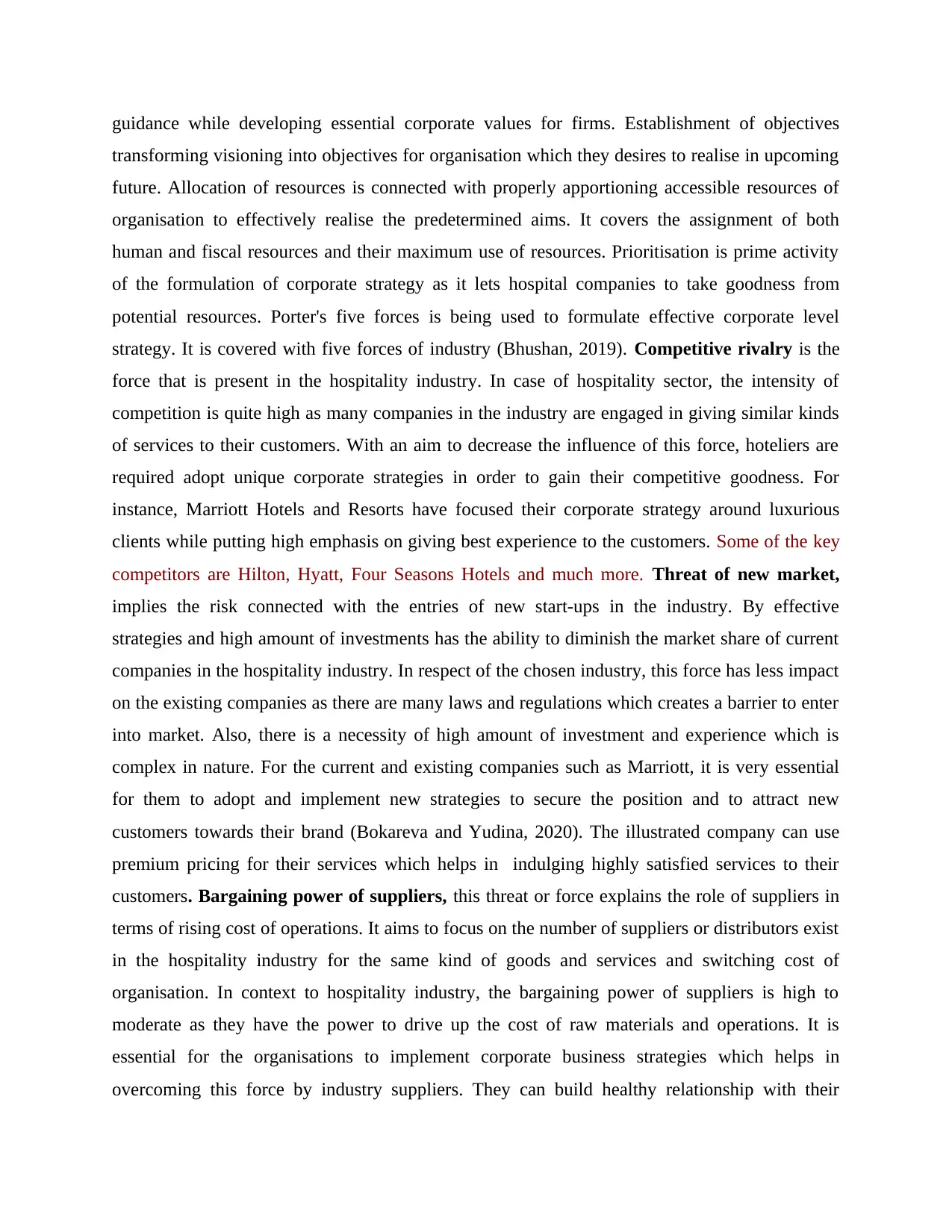
guidance while developing essential corporate values for firms. Establishment of objectives
transforming visioning into objectives for organisation which they desires to realise in upcoming
future. Allocation of resources is connected with properly apportioning accessible resources of
organisation to effectively realise the predetermined aims. It covers the assignment of both
human and fiscal resources and their maximum use of resources. Prioritisation is prime activity
of the formulation of corporate strategy as it lets hospital companies to take goodness from
potential resources. Porter's five forces is being used to formulate effective corporate level
strategy. It is covered with five forces of industry (Bhushan, 2019). Competitive rivalry is the
force that is present in the hospitality industry. In case of hospitality sector, the intensity of
competition is quite high as many companies in the industry are engaged in giving similar kinds
of services to their customers. With an aim to decrease the influence of this force, hoteliers are
required adopt unique corporate strategies in order to gain their competitive goodness. For
instance, Marriott Hotels and Resorts have focused their corporate strategy around luxurious
clients while putting high emphasis on giving best experience to the customers. Some of the key
competitors are Hilton, Hyatt, Four Seasons Hotels and much more. Threat of new market,
implies the risk connected with the entries of new start-ups in the industry. By effective
strategies and high amount of investments has the ability to diminish the market share of current
companies in the hospitality industry. In respect of the chosen industry, this force has less impact
on the existing companies as there are many laws and regulations which creates a barrier to enter
into market. Also, there is a necessity of high amount of investment and experience which is
complex in nature. For the current and existing companies such as Marriott, it is very essential
for them to adopt and implement new strategies to secure the position and to attract new
customers towards their brand (Bokareva and Yudina, 2020). The illustrated company can use
premium pricing for their services which helps in indulging highly satisfied services to their
customers. Bargaining power of suppliers, this threat or force explains the role of suppliers in
terms of rising cost of operations. It aims to focus on the number of suppliers or distributors exist
in the hospitality industry for the same kind of goods and services and switching cost of
organisation. In context to hospitality industry, the bargaining power of suppliers is high to
moderate as they have the power to drive up the cost of raw materials and operations. It is
essential for the organisations to implement corporate business strategies which helps in
overcoming this force by industry suppliers. They can build healthy relationship with their
transforming visioning into objectives for organisation which they desires to realise in upcoming
future. Allocation of resources is connected with properly apportioning accessible resources of
organisation to effectively realise the predetermined aims. It covers the assignment of both
human and fiscal resources and their maximum use of resources. Prioritisation is prime activity
of the formulation of corporate strategy as it lets hospital companies to take goodness from
potential resources. Porter's five forces is being used to formulate effective corporate level
strategy. It is covered with five forces of industry (Bhushan, 2019). Competitive rivalry is the
force that is present in the hospitality industry. In case of hospitality sector, the intensity of
competition is quite high as many companies in the industry are engaged in giving similar kinds
of services to their customers. With an aim to decrease the influence of this force, hoteliers are
required adopt unique corporate strategies in order to gain their competitive goodness. For
instance, Marriott Hotels and Resorts have focused their corporate strategy around luxurious
clients while putting high emphasis on giving best experience to the customers. Some of the key
competitors are Hilton, Hyatt, Four Seasons Hotels and much more. Threat of new market,
implies the risk connected with the entries of new start-ups in the industry. By effective
strategies and high amount of investments has the ability to diminish the market share of current
companies in the hospitality industry. In respect of the chosen industry, this force has less impact
on the existing companies as there are many laws and regulations which creates a barrier to enter
into market. Also, there is a necessity of high amount of investment and experience which is
complex in nature. For the current and existing companies such as Marriott, it is very essential
for them to adopt and implement new strategies to secure the position and to attract new
customers towards their brand (Bokareva and Yudina, 2020). The illustrated company can use
premium pricing for their services which helps in indulging highly satisfied services to their
customers. Bargaining power of suppliers, this threat or force explains the role of suppliers in
terms of rising cost of operations. It aims to focus on the number of suppliers or distributors exist
in the hospitality industry for the same kind of goods and services and switching cost of
organisation. In context to hospitality industry, the bargaining power of suppliers is high to
moderate as they have the power to drive up the cost of raw materials and operations. It is
essential for the organisations to implement corporate business strategies which helps in
overcoming this force by industry suppliers. They can build healthy relationship with their
Paraphrase This Document
Need a fresh take? Get an instant paraphrase of this document with our AI Paraphraser
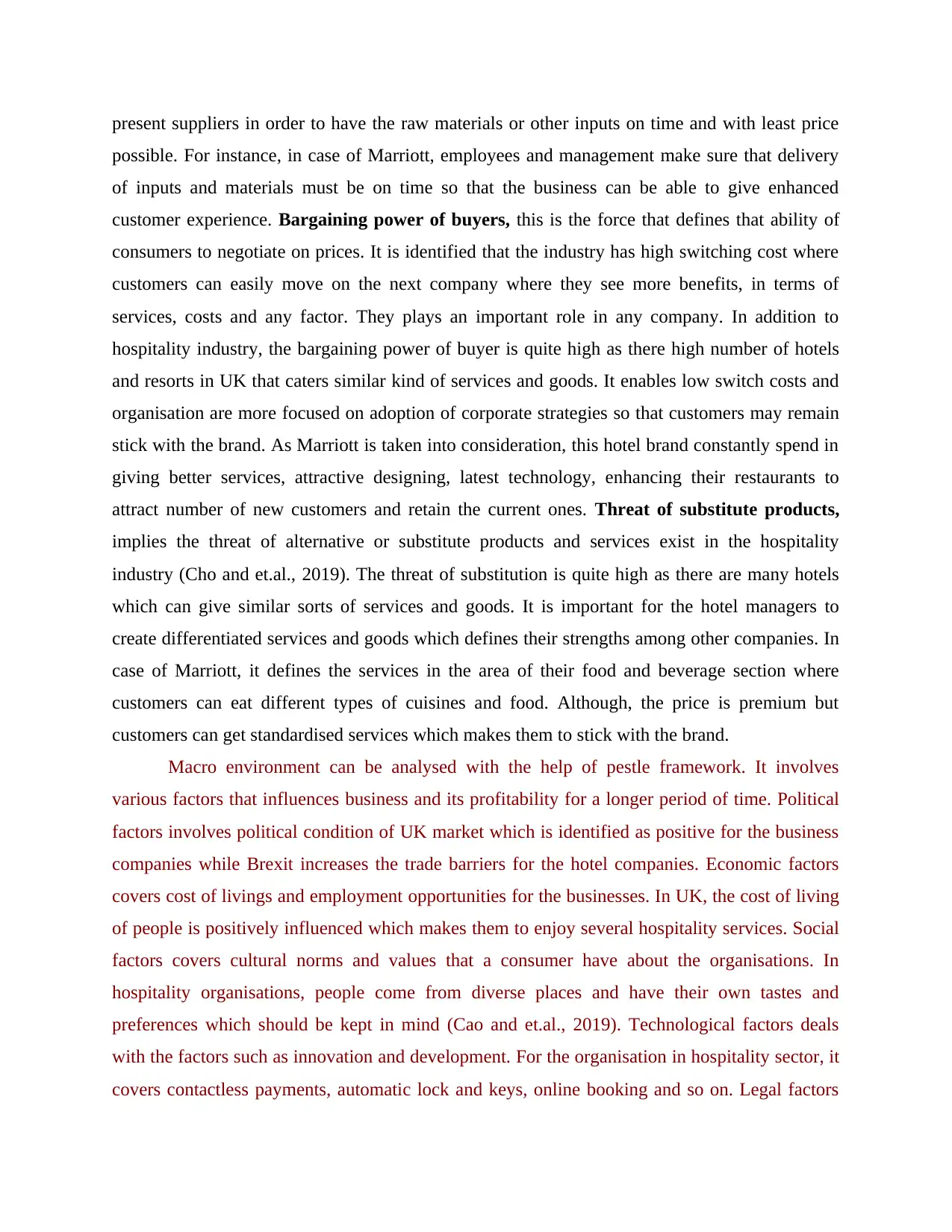
present suppliers in order to have the raw materials or other inputs on time and with least price
possible. For instance, in case of Marriott, employees and management make sure that delivery
of inputs and materials must be on time so that the business can be able to give enhanced
customer experience. Bargaining power of buyers, this is the force that defines that ability of
consumers to negotiate on prices. It is identified that the industry has high switching cost where
customers can easily move on the next company where they see more benefits, in terms of
services, costs and any factor. They plays an important role in any company. In addition to
hospitality industry, the bargaining power of buyer is quite high as there high number of hotels
and resorts in UK that caters similar kind of services and goods. It enables low switch costs and
organisation are more focused on adoption of corporate strategies so that customers may remain
stick with the brand. As Marriott is taken into consideration, this hotel brand constantly spend in
giving better services, attractive designing, latest technology, enhancing their restaurants to
attract number of new customers and retain the current ones. Threat of substitute products,
implies the threat of alternative or substitute products and services exist in the hospitality
industry (Cho and et.al., 2019). The threat of substitution is quite high as there are many hotels
which can give similar sorts of services and goods. It is important for the hotel managers to
create differentiated services and goods which defines their strengths among other companies. In
case of Marriott, it defines the services in the area of their food and beverage section where
customers can eat different types of cuisines and food. Although, the price is premium but
customers can get standardised services which makes them to stick with the brand.
Macro environment can be analysed with the help of pestle framework. It involves
various factors that influences business and its profitability for a longer period of time. Political
factors involves political condition of UK market which is identified as positive for the business
companies while Brexit increases the trade barriers for the hotel companies. Economic factors
covers cost of livings and employment opportunities for the businesses. In UK, the cost of living
of people is positively influenced which makes them to enjoy several hospitality services. Social
factors covers cultural norms and values that a consumer have about the organisations. In
hospitality organisations, people come from diverse places and have their own tastes and
preferences which should be kept in mind (Cao and et.al., 2019). Technological factors deals
with the factors such as innovation and development. For the organisation in hospitality sector, it
covers contactless payments, automatic lock and keys, online booking and so on. Legal factors
possible. For instance, in case of Marriott, employees and management make sure that delivery
of inputs and materials must be on time so that the business can be able to give enhanced
customer experience. Bargaining power of buyers, this is the force that defines that ability of
consumers to negotiate on prices. It is identified that the industry has high switching cost where
customers can easily move on the next company where they see more benefits, in terms of
services, costs and any factor. They plays an important role in any company. In addition to
hospitality industry, the bargaining power of buyer is quite high as there high number of hotels
and resorts in UK that caters similar kind of services and goods. It enables low switch costs and
organisation are more focused on adoption of corporate strategies so that customers may remain
stick with the brand. As Marriott is taken into consideration, this hotel brand constantly spend in
giving better services, attractive designing, latest technology, enhancing their restaurants to
attract number of new customers and retain the current ones. Threat of substitute products,
implies the threat of alternative or substitute products and services exist in the hospitality
industry (Cho and et.al., 2019). The threat of substitution is quite high as there are many hotels
which can give similar sorts of services and goods. It is important for the hotel managers to
create differentiated services and goods which defines their strengths among other companies. In
case of Marriott, it defines the services in the area of their food and beverage section where
customers can eat different types of cuisines and food. Although, the price is premium but
customers can get standardised services which makes them to stick with the brand.
Macro environment can be analysed with the help of pestle framework. It involves
various factors that influences business and its profitability for a longer period of time. Political
factors involves political condition of UK market which is identified as positive for the business
companies while Brexit increases the trade barriers for the hotel companies. Economic factors
covers cost of livings and employment opportunities for the businesses. In UK, the cost of living
of people is positively influenced which makes them to enjoy several hospitality services. Social
factors covers cultural norms and values that a consumer have about the organisations. In
hospitality organisations, people come from diverse places and have their own tastes and
preferences which should be kept in mind (Cao and et.al., 2019). Technological factors deals
with the factors such as innovation and development. For the organisation in hospitality sector, it
covers contactless payments, automatic lock and keys, online booking and so on. Legal factors
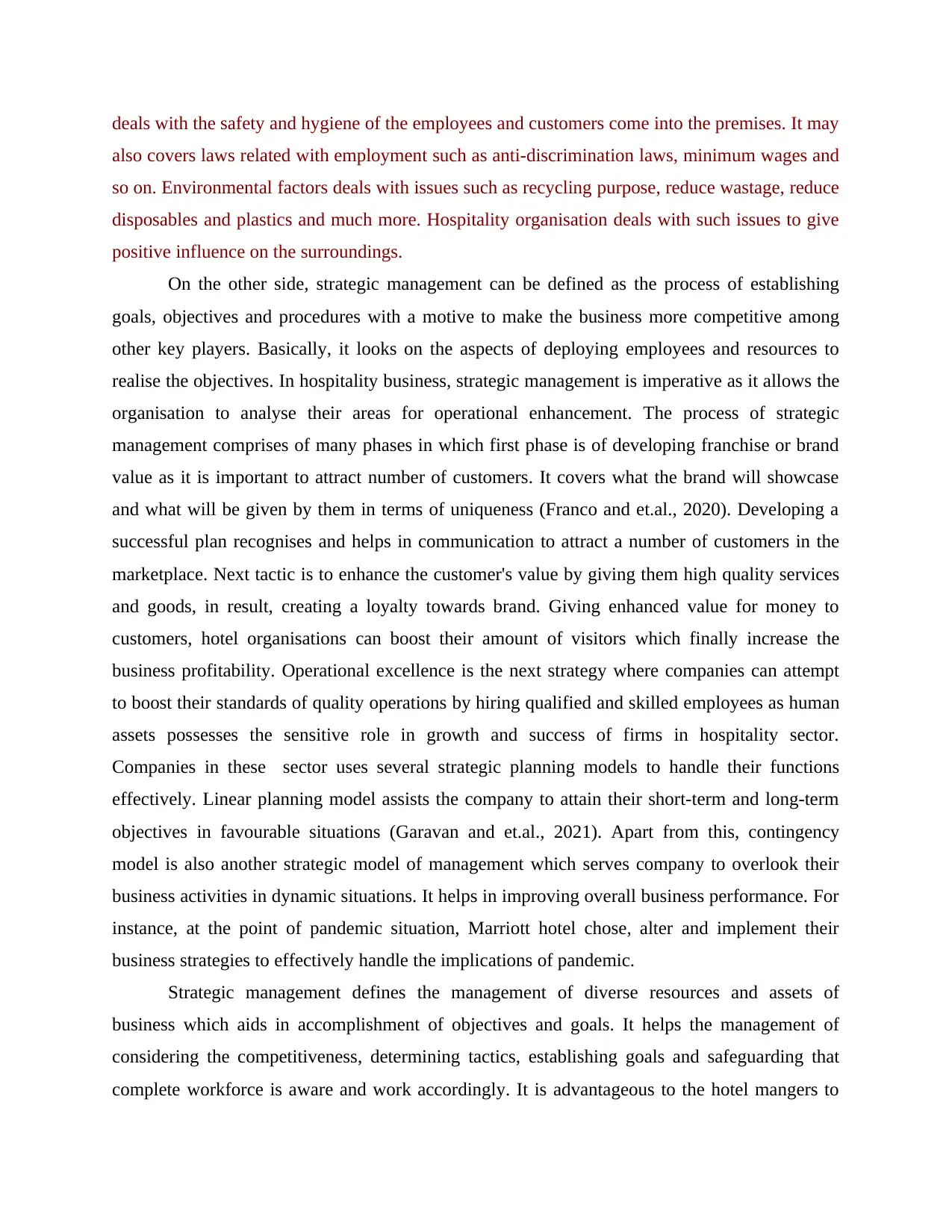
deals with the safety and hygiene of the employees and customers come into the premises. It may
also covers laws related with employment such as anti-discrimination laws, minimum wages and
so on. Environmental factors deals with issues such as recycling purpose, reduce wastage, reduce
disposables and plastics and much more. Hospitality organisation deals with such issues to give
positive influence on the surroundings.
On the other side, strategic management can be defined as the process of establishing
goals, objectives and procedures with a motive to make the business more competitive among
other key players. Basically, it looks on the aspects of deploying employees and resources to
realise the objectives. In hospitality business, strategic management is imperative as it allows the
organisation to analyse their areas for operational enhancement. The process of strategic
management comprises of many phases in which first phase is of developing franchise or brand
value as it is important to attract number of customers. It covers what the brand will showcase
and what will be given by them in terms of uniqueness (Franco and et.al., 2020). Developing a
successful plan recognises and helps in communication to attract a number of customers in the
marketplace. Next tactic is to enhance the customer's value by giving them high quality services
and goods, in result, creating a loyalty towards brand. Giving enhanced value for money to
customers, hotel organisations can boost their amount of visitors which finally increase the
business profitability. Operational excellence is the next strategy where companies can attempt
to boost their standards of quality operations by hiring qualified and skilled employees as human
assets possesses the sensitive role in growth and success of firms in hospitality sector.
Companies in these sector uses several strategic planning models to handle their functions
effectively. Linear planning model assists the company to attain their short-term and long-term
objectives in favourable situations (Garavan and et.al., 2021). Apart from this, contingency
model is also another strategic model of management which serves company to overlook their
business activities in dynamic situations. It helps in improving overall business performance. For
instance, at the point of pandemic situation, Marriott hotel chose, alter and implement their
business strategies to effectively handle the implications of pandemic.
Strategic management defines the management of diverse resources and assets of
business which aids in accomplishment of objectives and goals. It helps the management of
considering the competitiveness, determining tactics, establishing goals and safeguarding that
complete workforce is aware and work accordingly. It is advantageous to the hotel mangers to
also covers laws related with employment such as anti-discrimination laws, minimum wages and
so on. Environmental factors deals with issues such as recycling purpose, reduce wastage, reduce
disposables and plastics and much more. Hospitality organisation deals with such issues to give
positive influence on the surroundings.
On the other side, strategic management can be defined as the process of establishing
goals, objectives and procedures with a motive to make the business more competitive among
other key players. Basically, it looks on the aspects of deploying employees and resources to
realise the objectives. In hospitality business, strategic management is imperative as it allows the
organisation to analyse their areas for operational enhancement. The process of strategic
management comprises of many phases in which first phase is of developing franchise or brand
value as it is important to attract number of customers. It covers what the brand will showcase
and what will be given by them in terms of uniqueness (Franco and et.al., 2020). Developing a
successful plan recognises and helps in communication to attract a number of customers in the
marketplace. Next tactic is to enhance the customer's value by giving them high quality services
and goods, in result, creating a loyalty towards brand. Giving enhanced value for money to
customers, hotel organisations can boost their amount of visitors which finally increase the
business profitability. Operational excellence is the next strategy where companies can attempt
to boost their standards of quality operations by hiring qualified and skilled employees as human
assets possesses the sensitive role in growth and success of firms in hospitality sector.
Companies in these sector uses several strategic planning models to handle their functions
effectively. Linear planning model assists the company to attain their short-term and long-term
objectives in favourable situations (Garavan and et.al., 2021). Apart from this, contingency
model is also another strategic model of management which serves company to overlook their
business activities in dynamic situations. It helps in improving overall business performance. For
instance, at the point of pandemic situation, Marriott hotel chose, alter and implement their
business strategies to effectively handle the implications of pandemic.
Strategic management defines the management of diverse resources and assets of
business which aids in accomplishment of objectives and goals. It helps the management of
considering the competitiveness, determining tactics, establishing goals and safeguarding that
complete workforce is aware and work accordingly. It is advantageous to the hotel mangers to
⊘ This is a preview!⊘
Do you want full access?
Subscribe today to unlock all pages.

Trusted by 1+ million students worldwide
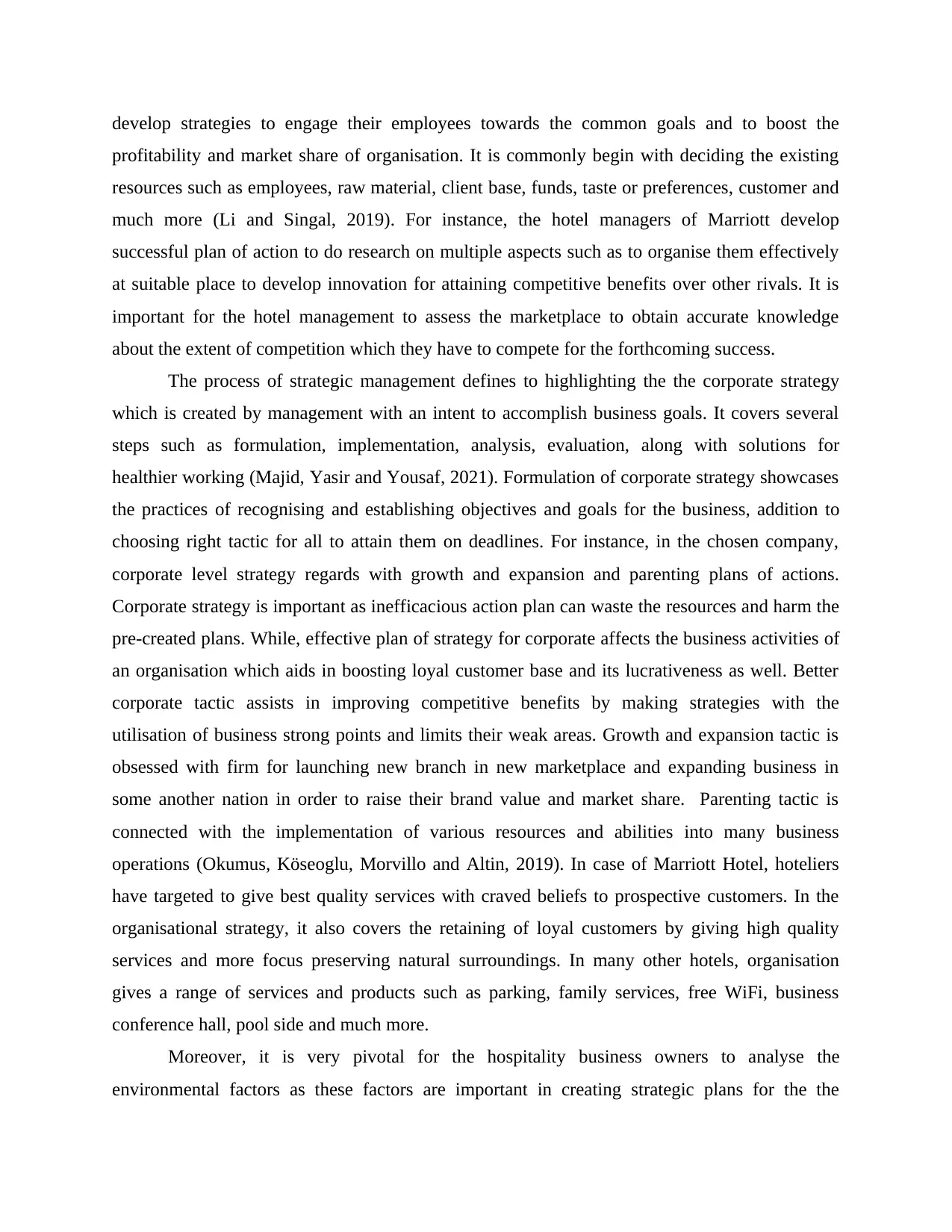
develop strategies to engage their employees towards the common goals and to boost the
profitability and market share of organisation. It is commonly begin with deciding the existing
resources such as employees, raw material, client base, funds, taste or preferences, customer and
much more (Li and Singal, 2019). For instance, the hotel managers of Marriott develop
successful plan of action to do research on multiple aspects such as to organise them effectively
at suitable place to develop innovation for attaining competitive benefits over other rivals. It is
important for the hotel management to assess the marketplace to obtain accurate knowledge
about the extent of competition which they have to compete for the forthcoming success.
The process of strategic management defines to highlighting the the corporate strategy
which is created by management with an intent to accomplish business goals. It covers several
steps such as formulation, implementation, analysis, evaluation, along with solutions for
healthier working (Majid, Yasir and Yousaf, 2021). Formulation of corporate strategy showcases
the practices of recognising and establishing objectives and goals for the business, addition to
choosing right tactic for all to attain them on deadlines. For instance, in the chosen company,
corporate level strategy regards with growth and expansion and parenting plans of actions.
Corporate strategy is important as inefficacious action plan can waste the resources and harm the
pre-created plans. While, effective plan of strategy for corporate affects the business activities of
an organisation which aids in boosting loyal customer base and its lucrativeness as well. Better
corporate tactic assists in improving competitive benefits by making strategies with the
utilisation of business strong points and limits their weak areas. Growth and expansion tactic is
obsessed with firm for launching new branch in new marketplace and expanding business in
some another nation in order to raise their brand value and market share. Parenting tactic is
connected with the implementation of various resources and abilities into many business
operations (Okumus, Köseoglu, Morvillo and Altin, 2019). In case of Marriott Hotel, hoteliers
have targeted to give best quality services with craved beliefs to prospective customers. In the
organisational strategy, it also covers the retaining of loyal customers by giving high quality
services and more focus preserving natural surroundings. In many other hotels, organisation
gives a range of services and products such as parking, family services, free WiFi, business
conference hall, pool side and much more.
Moreover, it is very pivotal for the hospitality business owners to analyse the
environmental factors as these factors are important in creating strategic plans for the the
profitability and market share of organisation. It is commonly begin with deciding the existing
resources such as employees, raw material, client base, funds, taste or preferences, customer and
much more (Li and Singal, 2019). For instance, the hotel managers of Marriott develop
successful plan of action to do research on multiple aspects such as to organise them effectively
at suitable place to develop innovation for attaining competitive benefits over other rivals. It is
important for the hotel management to assess the marketplace to obtain accurate knowledge
about the extent of competition which they have to compete for the forthcoming success.
The process of strategic management defines to highlighting the the corporate strategy
which is created by management with an intent to accomplish business goals. It covers several
steps such as formulation, implementation, analysis, evaluation, along with solutions for
healthier working (Majid, Yasir and Yousaf, 2021). Formulation of corporate strategy showcases
the practices of recognising and establishing objectives and goals for the business, addition to
choosing right tactic for all to attain them on deadlines. For instance, in the chosen company,
corporate level strategy regards with growth and expansion and parenting plans of actions.
Corporate strategy is important as inefficacious action plan can waste the resources and harm the
pre-created plans. While, effective plan of strategy for corporate affects the business activities of
an organisation which aids in boosting loyal customer base and its lucrativeness as well. Better
corporate tactic assists in improving competitive benefits by making strategies with the
utilisation of business strong points and limits their weak areas. Growth and expansion tactic is
obsessed with firm for launching new branch in new marketplace and expanding business in
some another nation in order to raise their brand value and market share. Parenting tactic is
connected with the implementation of various resources and abilities into many business
operations (Okumus, Köseoglu, Morvillo and Altin, 2019). In case of Marriott Hotel, hoteliers
have targeted to give best quality services with craved beliefs to prospective customers. In the
organisational strategy, it also covers the retaining of loyal customers by giving high quality
services and more focus preserving natural surroundings. In many other hotels, organisation
gives a range of services and products such as parking, family services, free WiFi, business
conference hall, pool side and much more.
Moreover, it is very pivotal for the hospitality business owners to analyse the
environmental factors as these factors are important in creating strategic plans for the the
Paraphrase This Document
Need a fresh take? Get an instant paraphrase of this document with our AI Paraphraser
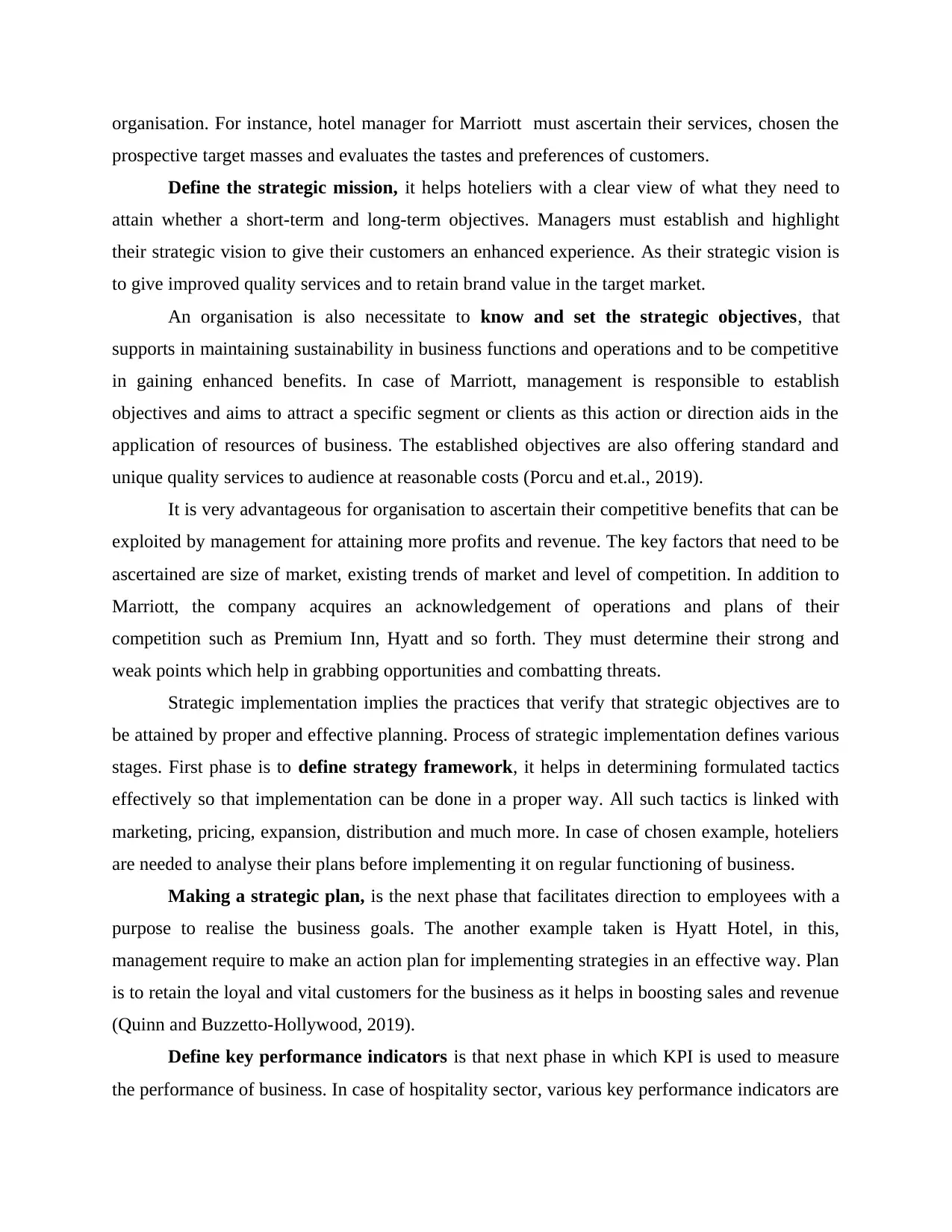
organisation. For instance, hotel manager for Marriott must ascertain their services, chosen the
prospective target masses and evaluates the tastes and preferences of customers.
Define the strategic mission, it helps hoteliers with a clear view of what they need to
attain whether a short-term and long-term objectives. Managers must establish and highlight
their strategic vision to give their customers an enhanced experience. As their strategic vision is
to give improved quality services and to retain brand value in the target market.
An organisation is also necessitate to know and set the strategic objectives, that
supports in maintaining sustainability in business functions and operations and to be competitive
in gaining enhanced benefits. In case of Marriott, management is responsible to establish
objectives and aims to attract a specific segment or clients as this action or direction aids in the
application of resources of business. The established objectives are also offering standard and
unique quality services to audience at reasonable costs (Porcu and et.al., 2019).
It is very advantageous for organisation to ascertain their competitive benefits that can be
exploited by management for attaining more profits and revenue. The key factors that need to be
ascertained are size of market, existing trends of market and level of competition. In addition to
Marriott, the company acquires an acknowledgement of operations and plans of their
competition such as Premium Inn, Hyatt and so forth. They must determine their strong and
weak points which help in grabbing opportunities and combatting threats.
Strategic implementation implies the practices that verify that strategic objectives are to
be attained by proper and effective planning. Process of strategic implementation defines various
stages. First phase is to define strategy framework, it helps in determining formulated tactics
effectively so that implementation can be done in a proper way. All such tactics is linked with
marketing, pricing, expansion, distribution and much more. In case of chosen example, hoteliers
are needed to analyse their plans before implementing it on regular functioning of business.
Making a strategic plan, is the next phase that facilitates direction to employees with a
purpose to realise the business goals. The another example taken is Hyatt Hotel, in this,
management require to make an action plan for implementing strategies in an effective way. Plan
is to retain the loyal and vital customers for the business as it helps in boosting sales and revenue
(Quinn and Buzzetto-Hollywood, 2019).
Define key performance indicators is that next phase in which KPI is used to measure
the performance of business. In case of hospitality sector, various key performance indicators are
prospective target masses and evaluates the tastes and preferences of customers.
Define the strategic mission, it helps hoteliers with a clear view of what they need to
attain whether a short-term and long-term objectives. Managers must establish and highlight
their strategic vision to give their customers an enhanced experience. As their strategic vision is
to give improved quality services and to retain brand value in the target market.
An organisation is also necessitate to know and set the strategic objectives, that
supports in maintaining sustainability in business functions and operations and to be competitive
in gaining enhanced benefits. In case of Marriott, management is responsible to establish
objectives and aims to attract a specific segment or clients as this action or direction aids in the
application of resources of business. The established objectives are also offering standard and
unique quality services to audience at reasonable costs (Porcu and et.al., 2019).
It is very advantageous for organisation to ascertain their competitive benefits that can be
exploited by management for attaining more profits and revenue. The key factors that need to be
ascertained are size of market, existing trends of market and level of competition. In addition to
Marriott, the company acquires an acknowledgement of operations and plans of their
competition such as Premium Inn, Hyatt and so forth. They must determine their strong and
weak points which help in grabbing opportunities and combatting threats.
Strategic implementation implies the practices that verify that strategic objectives are to
be attained by proper and effective planning. Process of strategic implementation defines various
stages. First phase is to define strategy framework, it helps in determining formulated tactics
effectively so that implementation can be done in a proper way. All such tactics is linked with
marketing, pricing, expansion, distribution and much more. In case of chosen example, hoteliers
are needed to analyse their plans before implementing it on regular functioning of business.
Making a strategic plan, is the next phase that facilitates direction to employees with a
purpose to realise the business goals. The another example taken is Hyatt Hotel, in this,
management require to make an action plan for implementing strategies in an effective way. Plan
is to retain the loyal and vital customers for the business as it helps in boosting sales and revenue
(Quinn and Buzzetto-Hollywood, 2019).
Define key performance indicators is that next phase in which KPI is used to measure
the performance of business. In case of hospitality sector, various key performance indicators are
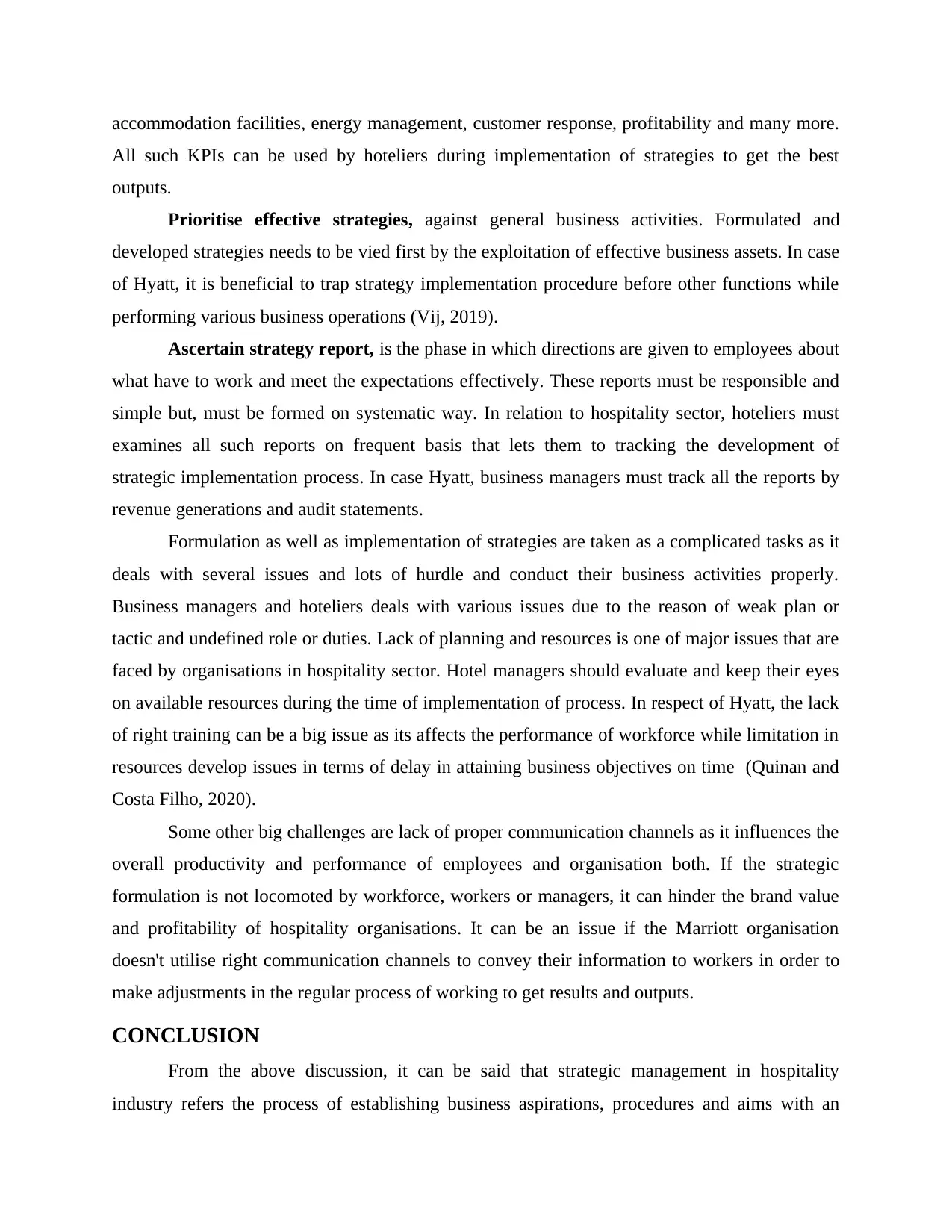
accommodation facilities, energy management, customer response, profitability and many more.
All such KPIs can be used by hoteliers during implementation of strategies to get the best
outputs.
Prioritise effective strategies, against general business activities. Formulated and
developed strategies needs to be vied first by the exploitation of effective business assets. In case
of Hyatt, it is beneficial to trap strategy implementation procedure before other functions while
performing various business operations (Vij, 2019).
Ascertain strategy report, is the phase in which directions are given to employees about
what have to work and meet the expectations effectively. These reports must be responsible and
simple but, must be formed on systematic way. In relation to hospitality sector, hoteliers must
examines all such reports on frequent basis that lets them to tracking the development of
strategic implementation process. In case Hyatt, business managers must track all the reports by
revenue generations and audit statements.
Formulation as well as implementation of strategies are taken as a complicated tasks as it
deals with several issues and lots of hurdle and conduct their business activities properly.
Business managers and hoteliers deals with various issues due to the reason of weak plan or
tactic and undefined role or duties. Lack of planning and resources is one of major issues that are
faced by organisations in hospitality sector. Hotel managers should evaluate and keep their eyes
on available resources during the time of implementation of process. In respect of Hyatt, the lack
of right training can be a big issue as its affects the performance of workforce while limitation in
resources develop issues in terms of delay in attaining business objectives on time (Quinan and
Costa Filho, 2020).
Some other big challenges are lack of proper communication channels as it influences the
overall productivity and performance of employees and organisation both. If the strategic
formulation is not locomoted by workforce, workers or managers, it can hinder the brand value
and profitability of hospitality organisations. It can be an issue if the Marriott organisation
doesn't utilise right communication channels to convey their information to workers in order to
make adjustments in the regular process of working to get results and outputs.
CONCLUSION
From the above discussion, it can be said that strategic management in hospitality
industry refers the process of establishing business aspirations, procedures and aims with an
All such KPIs can be used by hoteliers during implementation of strategies to get the best
outputs.
Prioritise effective strategies, against general business activities. Formulated and
developed strategies needs to be vied first by the exploitation of effective business assets. In case
of Hyatt, it is beneficial to trap strategy implementation procedure before other functions while
performing various business operations (Vij, 2019).
Ascertain strategy report, is the phase in which directions are given to employees about
what have to work and meet the expectations effectively. These reports must be responsible and
simple but, must be formed on systematic way. In relation to hospitality sector, hoteliers must
examines all such reports on frequent basis that lets them to tracking the development of
strategic implementation process. In case Hyatt, business managers must track all the reports by
revenue generations and audit statements.
Formulation as well as implementation of strategies are taken as a complicated tasks as it
deals with several issues and lots of hurdle and conduct their business activities properly.
Business managers and hoteliers deals with various issues due to the reason of weak plan or
tactic and undefined role or duties. Lack of planning and resources is one of major issues that are
faced by organisations in hospitality sector. Hotel managers should evaluate and keep their eyes
on available resources during the time of implementation of process. In respect of Hyatt, the lack
of right training can be a big issue as its affects the performance of workforce while limitation in
resources develop issues in terms of delay in attaining business objectives on time (Quinan and
Costa Filho, 2020).
Some other big challenges are lack of proper communication channels as it influences the
overall productivity and performance of employees and organisation both. If the strategic
formulation is not locomoted by workforce, workers or managers, it can hinder the brand value
and profitability of hospitality organisations. It can be an issue if the Marriott organisation
doesn't utilise right communication channels to convey their information to workers in order to
make adjustments in the regular process of working to get results and outputs.
CONCLUSION
From the above discussion, it can be said that strategic management in hospitality
industry refers the process of establishing business aspirations, procedures and aims with an
⊘ This is a preview!⊘
Do you want full access?
Subscribe today to unlock all pages.

Trusted by 1+ million students worldwide
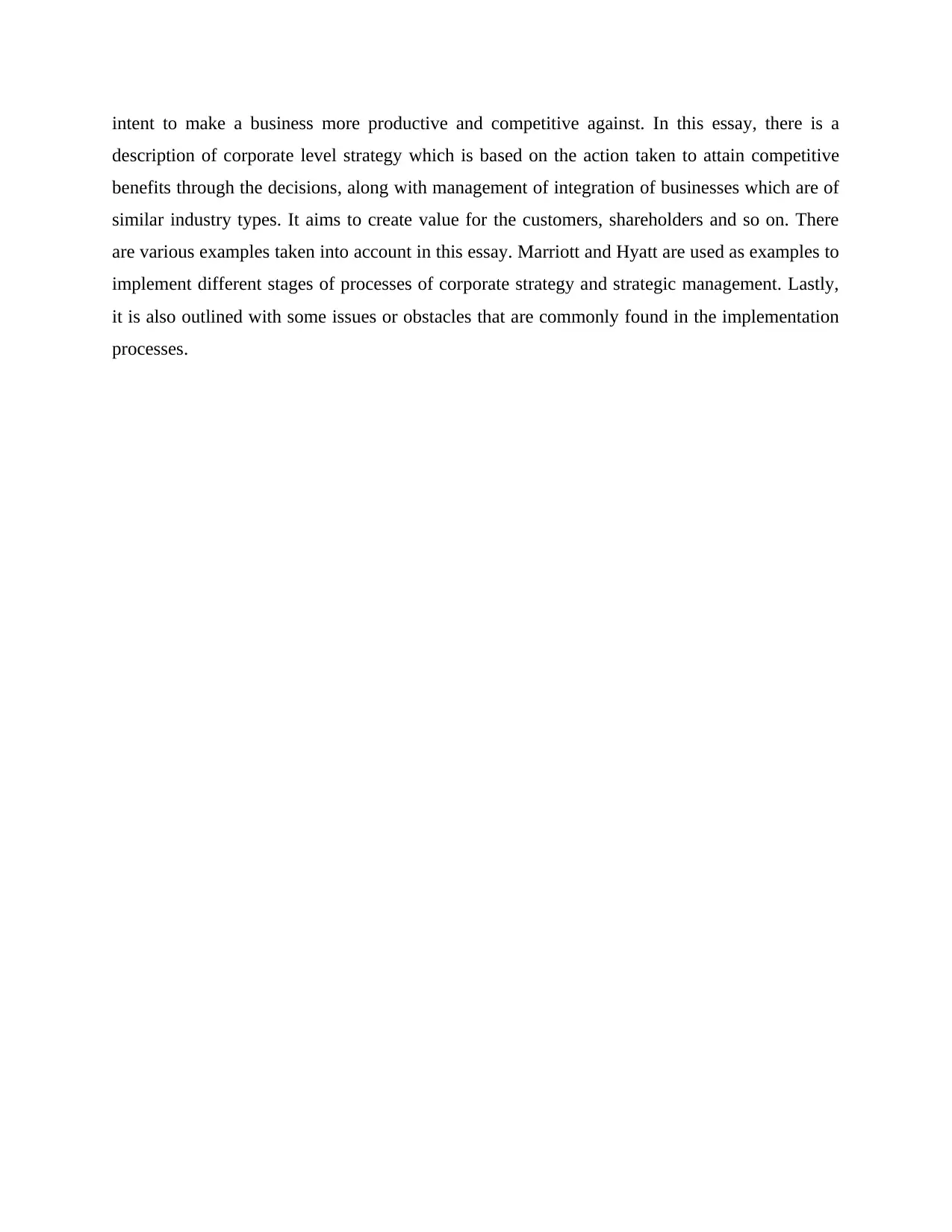
intent to make a business more productive and competitive against. In this essay, there is a
description of corporate level strategy which is based on the action taken to attain competitive
benefits through the decisions, along with management of integration of businesses which are of
similar industry types. It aims to create value for the customers, shareholders and so on. There
are various examples taken into account in this essay. Marriott and Hyatt are used as examples to
implement different stages of processes of corporate strategy and strategic management. Lastly,
it is also outlined with some issues or obstacles that are commonly found in the implementation
processes.
description of corporate level strategy which is based on the action taken to attain competitive
benefits through the decisions, along with management of integration of businesses which are of
similar industry types. It aims to create value for the customers, shareholders and so on. There
are various examples taken into account in this essay. Marriott and Hyatt are used as examples to
implement different stages of processes of corporate strategy and strategic management. Lastly,
it is also outlined with some issues or obstacles that are commonly found in the implementation
processes.
Paraphrase This Document
Need a fresh take? Get an instant paraphrase of this document with our AI Paraphraser
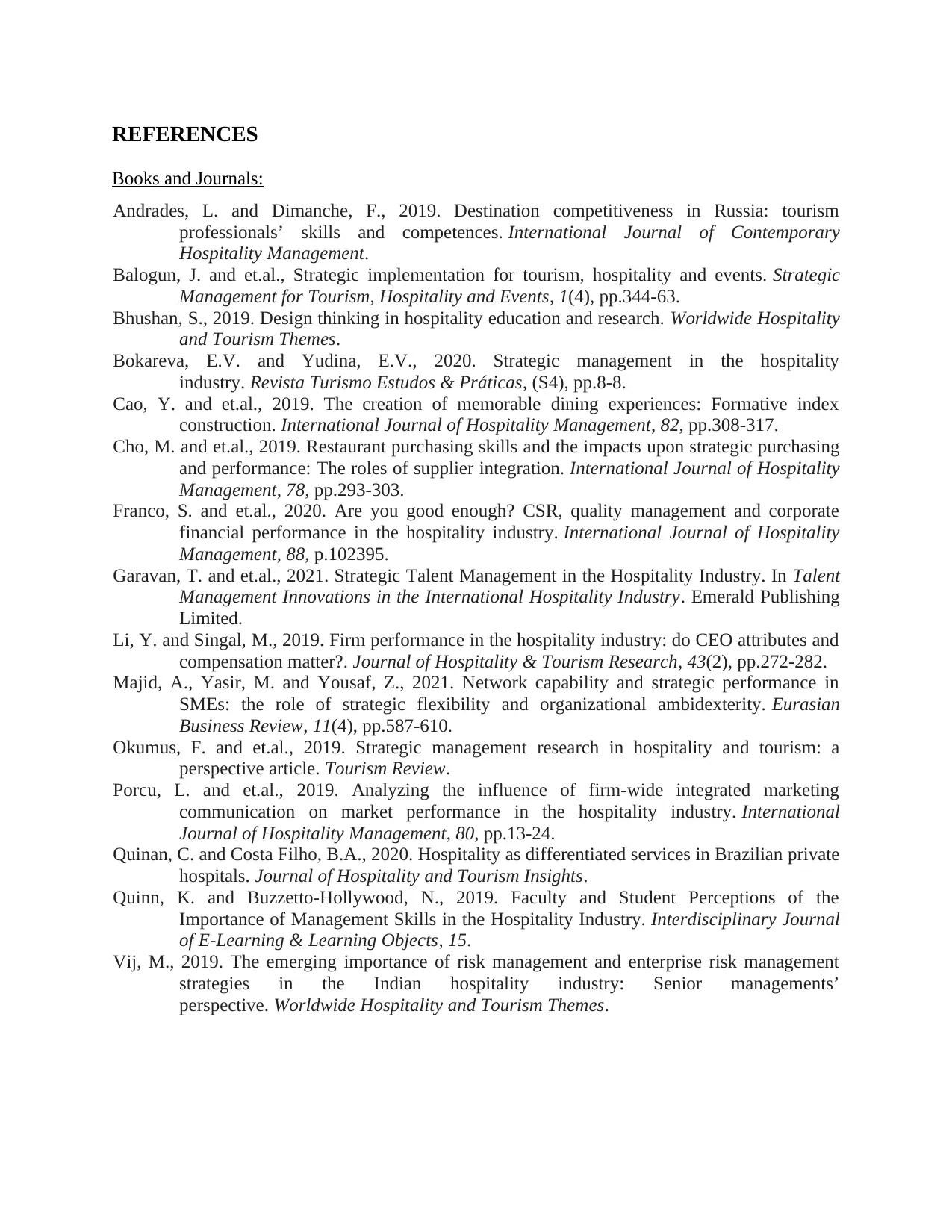
REFERENCES
Books and Journals:
Andrades, L. and Dimanche, F., 2019. Destination competitiveness in Russia: tourism
professionals’ skills and competences. International Journal of Contemporary
Hospitality Management.
Balogun, J. and et.al., Strategic implementation for tourism, hospitality and events. Strategic
Management for Tourism, Hospitality and Events, 1(4), pp.344-63.
Bhushan, S., 2019. Design thinking in hospitality education and research. Worldwide Hospitality
and Tourism Themes.
Bokareva, E.V. and Yudina, E.V., 2020. Strategic management in the hospitality
industry. Revista Turismo Estudos & Práticas, (S4), pp.8-8.
Cao, Y. and et.al., 2019. The creation of memorable dining experiences: Formative index
construction. International Journal of Hospitality Management, 82, pp.308-317.
Cho, M. and et.al., 2019. Restaurant purchasing skills and the impacts upon strategic purchasing
and performance: The roles of supplier integration. International Journal of Hospitality
Management, 78, pp.293-303.
Franco, S. and et.al., 2020. Are you good enough? CSR, quality management and corporate
financial performance in the hospitality industry. International Journal of Hospitality
Management, 88, p.102395.
Garavan, T. and et.al., 2021. Strategic Talent Management in the Hospitality Industry. In Talent
Management Innovations in the International Hospitality Industry. Emerald Publishing
Limited.
Li, Y. and Singal, M., 2019. Firm performance in the hospitality industry: do CEO attributes and
compensation matter?. Journal of Hospitality & Tourism Research, 43(2), pp.272-282.
Majid, A., Yasir, M. and Yousaf, Z., 2021. Network capability and strategic performance in
SMEs: the role of strategic flexibility and organizational ambidexterity. Eurasian
Business Review, 11(4), pp.587-610.
Okumus, F. and et.al., 2019. Strategic management research in hospitality and tourism: a
perspective article. Tourism Review.
Porcu, L. and et.al., 2019. Analyzing the influence of firm-wide integrated marketing
communication on market performance in the hospitality industry. International
Journal of Hospitality Management, 80, pp.13-24.
Quinan, C. and Costa Filho, B.A., 2020. Hospitality as differentiated services in Brazilian private
hospitals. Journal of Hospitality and Tourism Insights.
Quinn, K. and Buzzetto-Hollywood, N., 2019. Faculty and Student Perceptions of the
Importance of Management Skills in the Hospitality Industry. Interdisciplinary Journal
of E-Learning & Learning Objects, 15.
Vij, M., 2019. The emerging importance of risk management and enterprise risk management
strategies in the Indian hospitality industry: Senior managements’
perspective. Worldwide Hospitality and Tourism Themes.
Books and Journals:
Andrades, L. and Dimanche, F., 2019. Destination competitiveness in Russia: tourism
professionals’ skills and competences. International Journal of Contemporary
Hospitality Management.
Balogun, J. and et.al., Strategic implementation for tourism, hospitality and events. Strategic
Management for Tourism, Hospitality and Events, 1(4), pp.344-63.
Bhushan, S., 2019. Design thinking in hospitality education and research. Worldwide Hospitality
and Tourism Themes.
Bokareva, E.V. and Yudina, E.V., 2020. Strategic management in the hospitality
industry. Revista Turismo Estudos & Práticas, (S4), pp.8-8.
Cao, Y. and et.al., 2019. The creation of memorable dining experiences: Formative index
construction. International Journal of Hospitality Management, 82, pp.308-317.
Cho, M. and et.al., 2019. Restaurant purchasing skills and the impacts upon strategic purchasing
and performance: The roles of supplier integration. International Journal of Hospitality
Management, 78, pp.293-303.
Franco, S. and et.al., 2020. Are you good enough? CSR, quality management and corporate
financial performance in the hospitality industry. International Journal of Hospitality
Management, 88, p.102395.
Garavan, T. and et.al., 2021. Strategic Talent Management in the Hospitality Industry. In Talent
Management Innovations in the International Hospitality Industry. Emerald Publishing
Limited.
Li, Y. and Singal, M., 2019. Firm performance in the hospitality industry: do CEO attributes and
compensation matter?. Journal of Hospitality & Tourism Research, 43(2), pp.272-282.
Majid, A., Yasir, M. and Yousaf, Z., 2021. Network capability and strategic performance in
SMEs: the role of strategic flexibility and organizational ambidexterity. Eurasian
Business Review, 11(4), pp.587-610.
Okumus, F. and et.al., 2019. Strategic management research in hospitality and tourism: a
perspective article. Tourism Review.
Porcu, L. and et.al., 2019. Analyzing the influence of firm-wide integrated marketing
communication on market performance in the hospitality industry. International
Journal of Hospitality Management, 80, pp.13-24.
Quinan, C. and Costa Filho, B.A., 2020. Hospitality as differentiated services in Brazilian private
hospitals. Journal of Hospitality and Tourism Insights.
Quinn, K. and Buzzetto-Hollywood, N., 2019. Faculty and Student Perceptions of the
Importance of Management Skills in the Hospitality Industry. Interdisciplinary Journal
of E-Learning & Learning Objects, 15.
Vij, M., 2019. The emerging importance of risk management and enterprise risk management
strategies in the Indian hospitality industry: Senior managements’
perspective. Worldwide Hospitality and Tourism Themes.
1 out of 11
Related Documents
Your All-in-One AI-Powered Toolkit for Academic Success.
+13062052269
info@desklib.com
Available 24*7 on WhatsApp / Email
![[object Object]](/_next/static/media/star-bottom.7253800d.svg)
Unlock your academic potential
Copyright © 2020–2026 A2Z Services. All Rights Reserved. Developed and managed by ZUCOL.

